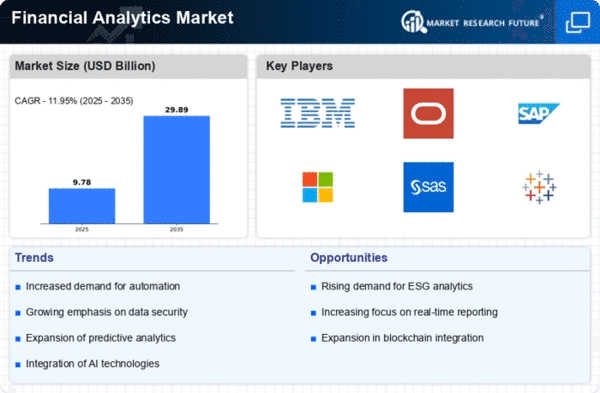Market Share
Financial Analytics Market Share Analysis
The Financial Analytics Market is significantly influenced by a multitude of market factors that collectively shape its landscape. One pivotal element is the growing complexity of financial data. As businesses expand and transactions become more intricate, the need for advanced analytics tools to decipher and derive insights from vast datasets becomes imperative. This surge in data complexity is directly proportional to the increasing demand for sophisticated financial analytics solutions that can provide meaningful interpretations and aid in decision-making.
Furthermore, the rise of artificial intelligence (AI) and machine learning (ML) plays a pivotal role in shaping the Financial Analytics Market. These technologies empower analytics tools to process and analyze vast amounts of financial data with unprecedented speed and accuracy. The ability of AI and ML algorithms to identify patterns, forecast trends, and detect anomalies enhances the overall efficiency of financial analytics, making them indispensable for businesses aiming to stay competitive in today's dynamic market environment.
Regulatory compliance is another crucial factor influencing the Financial Analytics Market. With ever-evolving financial regulations and compliance requirements, businesses are compelled to invest in analytics solutions that can ensure adherence to these standards. Financial analytics tools equipped with regulatory compliance features provide companies with the capability to navigate complex regulatory landscapes seamlessly, mitigating the risk of non-compliance and associated penalties.
Globalization also plays a significant role in shaping the Financial Analytics Market. As businesses expand their operations across borders, the need for analytics solutions that can consolidate and analyze financial data from diverse geographical locations becomes paramount. Financial analytics tools that offer multi-currency support, language localization, and adaptability to regional financial reporting standards gain prominence in this globalized business environment.
The increasing awareness of the importance of data-driven decision-making is another market factor driving the adoption of financial analytics solutions. Businesses recognize the value of leveraging data to gain actionable insights that can inform strategic decisions. Financial analytics tools, equipped with intuitive dashboards and customizable reports, empower decision-makers to access real-time insights and make informed choices, fostering a culture of data-driven decision-making across organizations.
Moreover, the Financial Analytics Market is significantly impacted by the rise of cloud computing. Cloud-based financial analytics solutions offer scalability, flexibility, and cost-effectiveness, making them an attractive choice for businesses of all sizes. The ability to access analytics tools and insights from anywhere with an internet connection enhances collaboration and streamlines decision-making processes, further contributing to the market's growth.
Cybersecurity concerns also influence the Financial Analytics Market. With the increasing frequency and sophistication of cyber threats, businesses are prioritizing the security of their financial data. Analytics solutions that incorporate robust security measures, such as encryption, access controls, and threat detection, are preferred by organizations seeking to safeguard their sensitive financial information.
In conclusion, the Financial Analytics Market is shaped by a complex interplay of factors ranging from the growing complexity of financial data to the influence of AI and ML, regulatory compliance, globalization, the importance of data-driven decision-making, the rise of cloud computing, and cybersecurity considerations. Businesses navigating this dynamic landscape recognize the need for advanced financial analytics solutions that can not only analyze data but also address these market factors, providing a comprehensive and strategic approach to financial decision-making.



















Leave a Comment